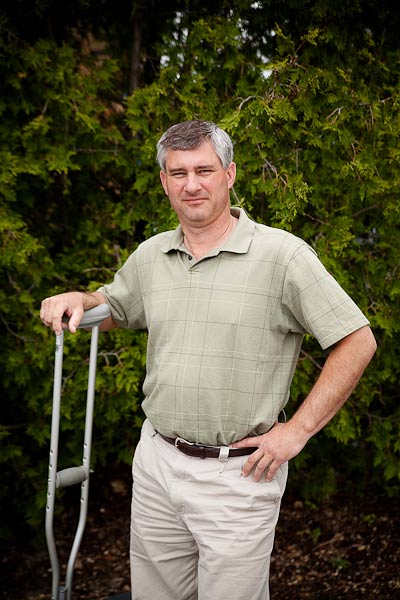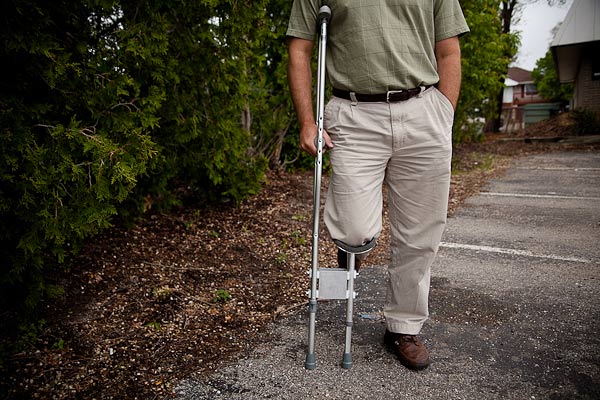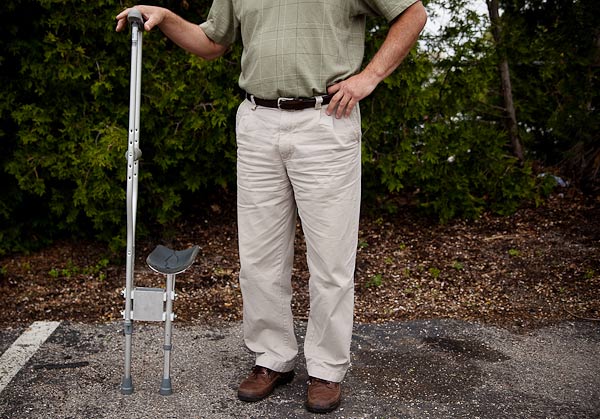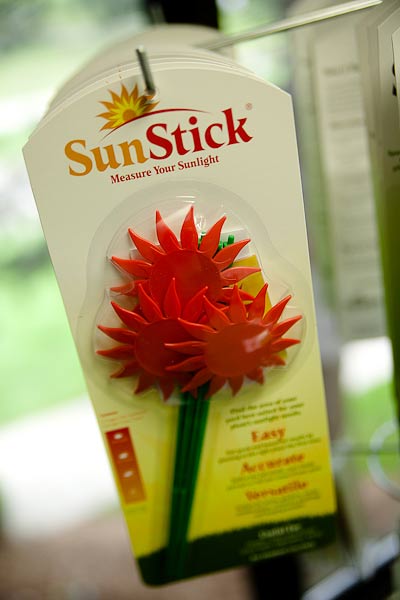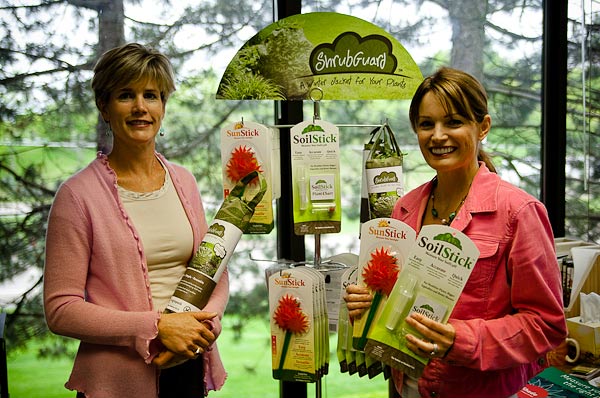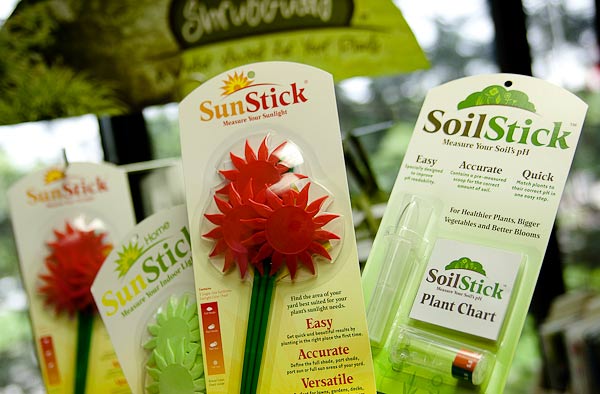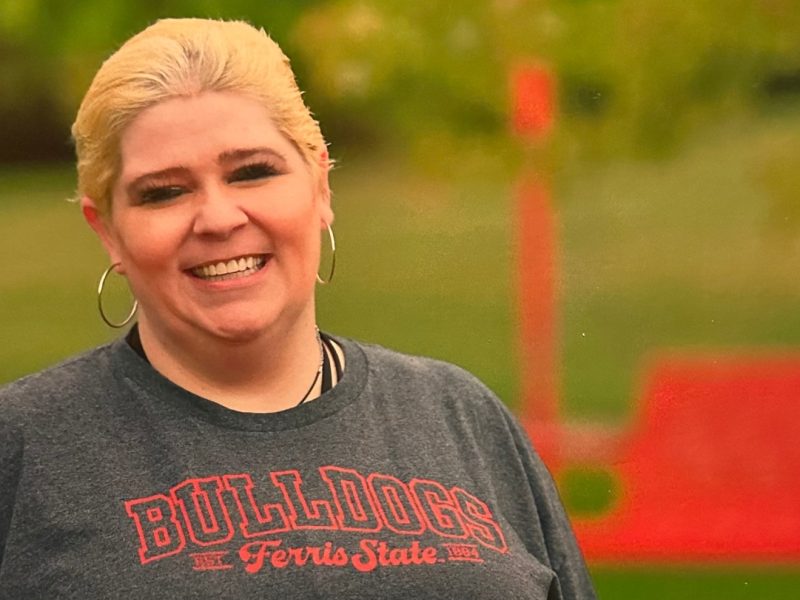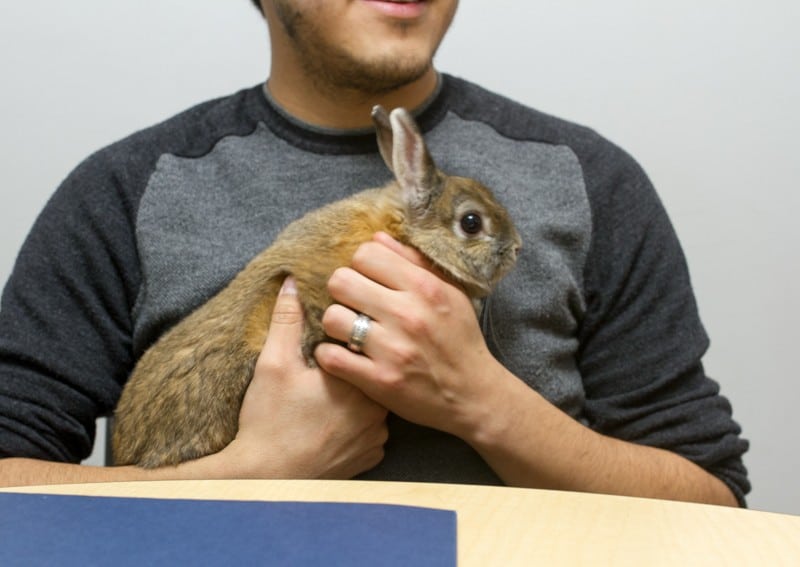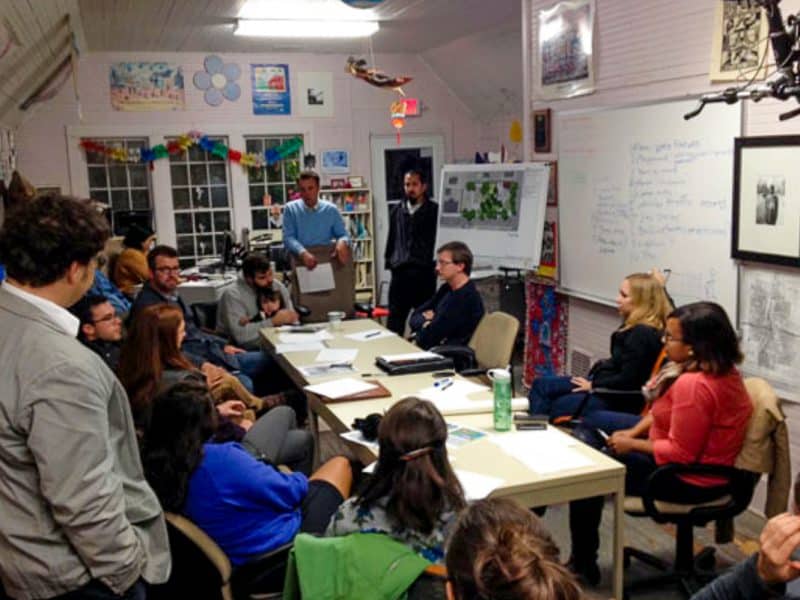Mothers of Inventions: the Maker Movement Thrives in Metro Grand Rapids
Invention has become a necessity for a number of local entrepreneurs who just aren’t satisfied with the status quo. Cynthia VanRenterghem and Kerry VerMeulen launched a company selling a nifty gardening aid that started over their chance conversation in a driveway.
With 2.5 million sets of crutches sold nationwide each year, the scenario for local inventor Mick Hanna was simple: Invent a mobility device better than existing options and make loads of money.
Hence, “The Easy Crutch,” a 2-footed gadget that’s basically a hybrid between crutches and a knee scooter. But unlike the latter, Hanna’s invention can go up and down stairs, and it’s physically easier to use than the former.
“It seems like the better the idea, the more people would say ‘Boy, that’s so simple. Why didn’t I think of that?'” says Hanna, 46, a Fremont man who works property maintenance in Grand Rapids. “People who see our product, that’s what they say.
“Our raw market is huge. Our target right now is 5 percent of that market, which is 125,000 devices a year. If we can bring that to Grand Rapids, it helps the whole community and picks up the slack from the auto industry decline.”
It seems a no-brainer and, based on the feedback he has received, Hanna is geeked about the prospects of his creation. Yet, as “The Easy Crutch” prepares to go to market next month, a little more than a year after it was conceived, the inventor’s whirlwind education in product development proves his device is no quick fix for what ails the region’s industrial base.
Still, in Hanna and other area grassroots inventors, Grand Rapids possesses a collective creativity that may be a timely aid for the local economy’s continued recovery.
They’re Out There
“There’s definitely an inventing scene,” says Dan Clark, president of Grand Rapids Inventors Network. “There’s people always out there with ideas. We advance their ideas.
“There’s probably a lot of people out there we can help.”
The burgeoning group of “garage tinkerers” was formed last August and now has about 35 members. Meeting at 6 p.m. on the second Tuesday of each month at Grand Valley State University’s Cook-DeVos Center for Health Sciences, 301 Michigan St. NE, they help each other channel ideas into new products and services, bringing in speakers to offer guidance on legal protection of ideas, product development and manufacturing.
Though Clark, 43, has no widget of his own invention, the founder of Dahti Seating has devised manufacturing innovations and now does business consulting under Plum Crazy Development. He started the local inventors network last summer after being involved for a few years with the Muskegon Inventors Network.
Prior to each meeting, the network offers product review sessions where inventors, for a $35 fee, can get a blunt evaluation of their idea. Bouncing thoughts off a forum of tinkering peers can help concepts mature into viable products and services, Clark says.
“It is invaluable the amount of free brainstorming and ‘Well, this is what I did’ or ‘You can trust this person’ or ‘Well, I don’t see this the way you see it,'” Hanna says. “They’re encouraging, but they’re realistic in their advice.”
It was the day after his 45th birthday, in March 2009, that Hanna ruptured his Achilles tendon playing basketball. He knew regular crutches would not let him get immediately back to work because he wouldn’t be able to carry anything, so he crafted a 14-inch, stainless steel prototype of “The Easy Crutch.”
For the past year, Hanna and a partner, co-worker Alastair Brown, of Standale, have worked to fine-tune the design, making the crutch easily adjustable, lighter weight and cheaper to manufacture. There’s also the business side of the idea, which is being marketed to health care professionals and durable medical equipment dealers. And don’t forget the legal aspects, from copyright protection to liability exposure.
Pieces of the Puzzle
Hanna tapped the inventors network and also took advantage of several free business resources in the area, from the Michigan Small Business and Technology Development Center to The Right Place to the Service Corps of Retired Executives to the Newaygo County Economic Development Office to the West Michigan Science and Technology Initiative.
“Everybody I’ve met with, holy cow, knowledgeable people that have so many years of experience,” Hanna says. “Each one of them gave me a piece of the whole puzzle of how to get a product to market. In this area there are so many free resources that want to build manufacturing that they will sit down with you and give you help.
“There are good ideas out there all over the place. Most companies want to see a finished product and most of them would like to see some sales. It’s an education all along the way.”
Deborah Tacoma, inventor of the Freedom Wand, hooked up with the Muskegon network to gauge her idea for a personal hygiene aid after breaking her back in an auto accident four years ago. As she recovered, the Zeeland woman couldn’t take care of herself and found no tool on the market to help. So she created a kind of multi-purpose plastic hand that’s able to grasp toilet paper, a razor, a loofah or an ointment applicator.
“I couldn’t shave my legs. I couldn’t apply ointment to a very raw bottom. I couldn’t wipe my bottom,” Tacoma recalled. “I thought ‘This is ridiculous.’
“Most people don’t just go to the bathroom at home so you have to have something portable. You can take (the Freedom Wand) with you wherever you need to go and no one needs to know.”
“If I Had Only Known…”
A friend warned her she’d never bring the product to market and, looking back, Tacoma concedes that “if I would have known what she knew, I would have agreed with her.” But ignorance is bliss, and in 2006 she started meeting with a patent attorney and manufacturers. An industrial design student drew up a prototype and, two years ago this month, she shipped her first wand. In between, Tacoma made “a slow and steady progress that was way more difficult and time consuming than I had anticipated.”
Among the challenges: figuring out how to set the price for different sales channels and learning where to get the biggest bang for her marketing buck. Since she’s “just a mom who broke her back,” guidance from fellow inventors helped her avoid some mistakes and encouraged her to keep pursuing her product, which sells on Web sites, online catalogs and retail stores.
Tacoma just got her first international order, from Australia, but her work is far from done. She’s now teaming with an engineer who specializes in plastics to refine the Freedom Wand.
“Inventors think they can’t go to market until they have a perfect product,” says Tacoma, 48. “Products always evolve. It’s not going to be perfect for a long time. As it’s in the market you’re going to realize ‘Oh, I should have done this different or I should have done that different.'”
Fun Skating on Thin Ice
For Cynthia VanRenterghem and Kerry VerMeulen, a pair of East Grand Rapids women who three years ago created a nifty gardening aid, the initial work of inventing now is paying dividends as their base concept evolves into a new products.
Their original SunStick, a plastic flower that measures the amount of sunlight in an area to help gardeners select the right plants, now has yielded innovations including SoilStick, a soil pH tester, and SunStick Home, which measures indoor light for house plants. Their company, Plumstone, also has come out with a new product called ShrubGuard, a more attractive cold-weather wrap for outdoor landscaping.
“It’s really the same idea of trying to solve problems for gardeners,” says VanRenterghem, 43. “Our classic conversation was in the driveway. I think we were probably trading kids, and (Kerry) says ‘I have an idea for a product.’ And I’ve always wanted to bring a product to market. And we really had no idea how to go about it.
“For a long time we were looking at each other saying, ‘Well, we think it’s a good idea, but does anybody else?’ You want objective observers. Retailers are really good because they’re on the front lines talking to consumers every day.”
The pair ran into a couple of technology dead-ends before linking with a scientist in Ohio who devised the SunStick with light-reacting ink. They talked with retailers to come up with the best packaging and pricing and, one year after starting Plumstone, the first SunStick was sold. Last year, the product launched nationwide.
“There are definitely times when we feel like we’re skating on thin ice, but there’s a lot of great opportunity ahead and potential,” VanRenterghem says. “We’re not living the high life, but we feel good about where we’ve come.
“My partner turned to me one day and says ‘I could work on this 24-7,’ and I feel the same way. It’s a very creative process. There’s more growing to do.”
On the cusp of launching “The Easy Crutch,” Hanna aims to start small this year, building a record of sales, before pushing to grow the product beyond the local area. The idea, he believes, is simple and sound. But it’s not a new idea, he adds, “it’s just that nobody has ever gotten it to market.”
With Hanna and his inventive peers thinking big, and collaboratively minding the details, that soon may change.
“You can learn to hate your product before you even get it on the market because you’re constantly thinking about it,” he says. “Once you get that entrepreneurial bug, the prospect of where this new business could go, it’s almost intoxicating.”
Matt Vande Bunte writes about business, government, religion and other things. His work has appeared in newspapers including The Grand Rapids Press and Chicago Tribune and in assorted sectors of cyberspace.
Photos:
Marty Coon (3)
The SunStick (2)
Cynthia VanRenterghem and Kerry VerMeulen
Photographs by Brian Kelly -All Rights Reserved

